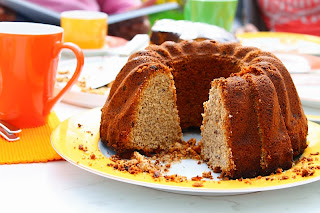Here's a look at just a few traditions and customs:
 |
| A German Tradition: Kaffee und Kuchen |
1. Kaffee und Kuchen- What's more pleasant than a relaxing afternoon of drinking coffee and eating cake? Both cafes and private homes provide an atmosphere for this indulgence. In addition to mouth-watering pastries, German cafes provide large assortments of cake - Käsekuchen (cheesecake), Schwarzwälder Kirschtorte, (Black Forest Cake) and Butterkuchen (Butter Cake) to name a few. Around 3pm or 4pm, it is very common to find many Germans indulging in a cup of hot coffee or cappuccino and a large slice of heavenly kuchen. Students, enjoy your host family's cooking of these delectable treats!
2. Weihnachtsmarkt (Christmas Markets) - German Christmas markets are famous around the world. In most towns in Germany, whether small or large, Christmas markets are annual traditions that start at the beginning of Advent. Vendors set up stalls and sell homemade ornaments, gingerbread and many, many other treats. If you are visiting Germany during late November and early December, make sure to find your way to this German tradition.
3. Christmas Eve- In Germany, it is custom to share gifts with family members on Christmas Eve and not Christmas morning. Of course, each family may be different, but for most German households, Christkind, an angelic child, delivers gifts to children on Christmas Eve. For most families, the Christmas Tree, or Tannenbaum, is put up and decorated on or near Christmas Eve and not weeks before.
4. Tracht (Traditional Dress)- When a foreigner thinks of Germany, traditional dress often comes to mind, namely the Dirndl and Lederhosen. Many small villages and regions have traditional dress that is worn for festivals, holidays and other special events. Many Germans are proud of their heritage and some Bavarians even wear their Lederhosen for Sunday lunch. Mainly, however, you can spot this tracht at Oktoberfest in Munich!
 |
| Traditional Trachten: Dirndl and Lederhosen |
6. New Year's Eve- An interesting New Year's Eve tradition is the "Bleigießen" or "Lead Pouring" where a lead figure is melted over a candle and then poured into a bowl of water. A new figure or shape is seen in the water and predicts what the coming year will bring. For instance, the shape of a ball may represent good luck rolling your way.
Have you experienced other German customs and traditions? Please share them with us in the comment section below!
No comments:
Post a Comment